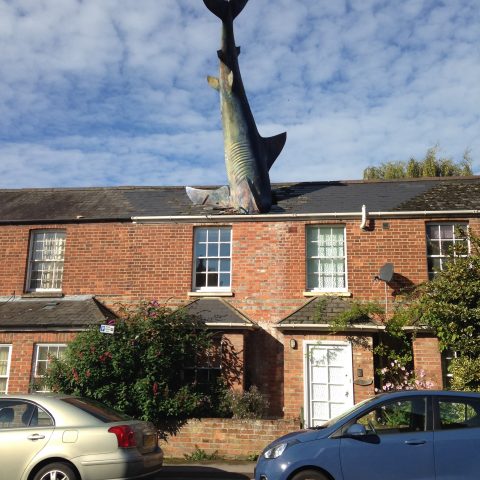Not since college have I had this much joy over bringing home a mismatched set of two forks, two knives, and two spoons. But we had been living for weeks sharing one spoon. Six utensils was a considerable upgrade.
It is with great embarrassment that I share with you the story of how we came upon our most cherished possession or how close we came to dumpster diving.
We were staying in St. Hughes College. This was the college was most notable for extensive gardens and the most atrocious breakfast, which inspired eating out. One Saturday morning we ventured into Summertown, an upscale community to do laundry. To demonstrate how posh this community is, the public laundry is next to a wine café that hosts impressive live jazz and across the street are several fine-dining restaurants. There was not a pawn or tattoo shop in sight.
The sign in the “launderette” said “do not leave property unattended”, but we felt safe that our worn jeans and logoed laundry bag would not attract any interest from what is sure to be discriminating thieves in Summertown. So we loaded the washer, stashed the bag, and ventured out to see what Summertown offered.
We found a tree-lined sleepy street filled with typical main street shops, which looked like “Anytown” USA. As we enjoyed the silence, it soon started buzzing with the excitement of a farmers’ market. I’m a big fan of farmers’ markets, but I’m sorry to say there isn’t a measurable difference between a posh town in Oxford and any other Farmers’ Market. There was the typical vendors: fresh fruit and vegetables, hearth breads and pastries, homemade jams, meats and sausages, across from the fresh whole fish, and assorted other bits and bots.
As it was time for breakfast, we headed for the pastries. An elderly couple behind the table quickly boasted about the scones. They were made fresh just that morning and the honey was from a local beekeeper, but it wasn’t their honey, and therefore they weren’t responsible for it. We decided to risk, the unwarranteed honey, and purchased two warm scones and a jar of the local honey.
As she packaged our breakfast, we innocently asked if she had a spoon to spread the honey. Suddenly chaos erupted. The elderly woman began rummaging through bags and boxes. Then, as wives often do, she looked desperately at her husband, who jumped into action. Bags flying, boxes shifting, and the elderly man crouched under the table, after a moment we heard a desperate cry for help. And as wives often do, the elderly woman reached down to assist her husband in rising from all fours. We tried to stop them, but they were determined. After what seemed like an eternity of two elderly infirmed English farmers scrambling around, the wife found a spoon. She washed it and handed it to us rapped in a napkin.
When we unwrapped it, we protested. There must be something wrong. This was a real spoon. We held the trophy up and showed her. It said stainless steel not Solo or Dixie. The woman insisted we should take the spoon and before she could reconsider we rewrapped it carefully in the napkin and fled.
We walked and walked until we were sure that we had a sizable distance between the farmers’ market and us. We sat and opened the napkin again. Sure enough, we were not mistaken. It was a real spoon. Our first. We held it up, practically in tears with our excitement. Hunger gone. We sat for a long time and stared at our most prized possession. Like cavemen, we had acquired our first tool and we would not take it for granted. We didn’t know how long we would go until we owned another tool. In fact, it took us almost a month. Now we have seven tools; we are practically civilized.

